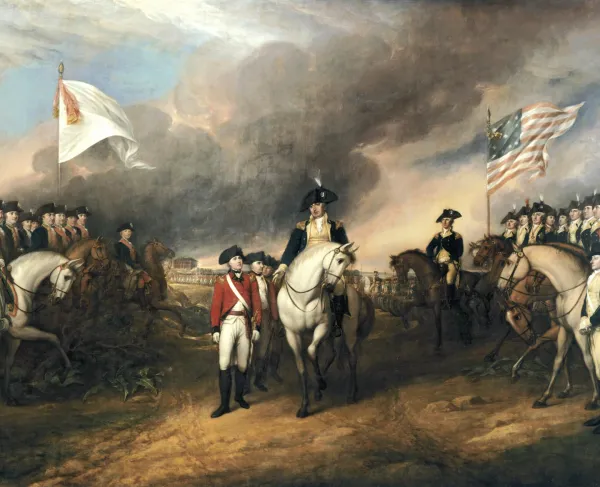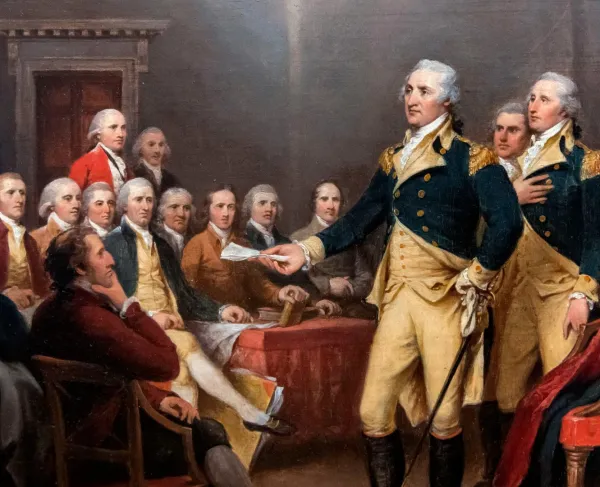Veterans’ Voices: Hear From Veterans Participating in the Saratoga Archaeological Project

Read firsthand accounts from participants in the American Veterans Archaeological Recovery (AVAR) project at Saratoga and learn about the impact rehabilitation archaeology and how it can help veterans reacclimate to civilian society:
- Karen Reed retired from the U.S. Air Force with more than 20 years of service, but still struggled to reacclimate to life out of uniform. AVAR helped her envision new avenues to pursue in civilian life.
- Greg Ashcroft, who medically separated from the U.S. Army, feels a deeper connection to the artifacts unearthed at Saratoga than he ever anticipated, knowing that they were last touched by a long-ago soldier not so different from him.
- Tom Wyatt, a retired Army sergeant, believes that AVAR participants feel a far greater connection to the work their doing than an average person would. To him, there is a responsibility to tell these stories as an extension of his own service to the nation.
- Zeth Lujan, an active AVAR participant, was inspired to pursue a degree in archaeology after being surrounded by history during his deployments to Afghanistan with the U.S. Army.
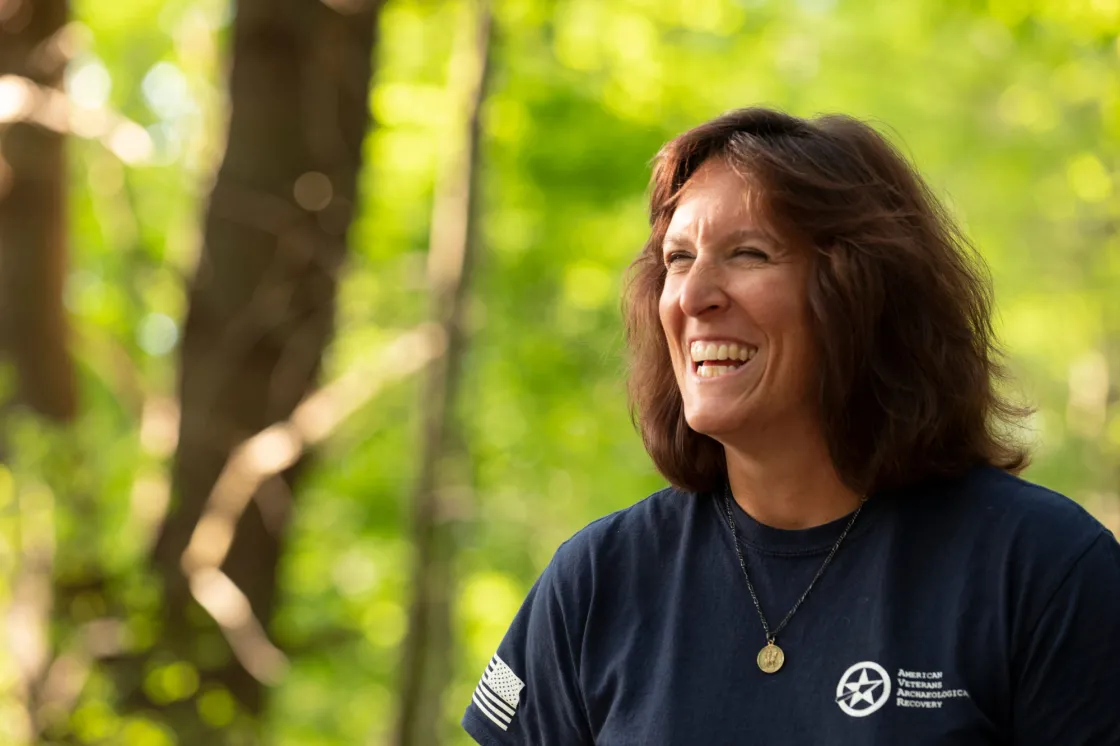
Hear from Karen Reed:
My name is Karen Reed and I'm currently from Albuquerque, N.M. I heard about AVAR a little unconventionally. I had never done anything with a vet-specific program before and I was looking for something to grab my interest. I've been out of the military about four years, and I was really looking for something to do that could keep me active and engaged in the next part of my life. I did a Google search looking for veterans’ organizations and AVAR popped up. Boom! That's it. That's what I wanted to do.
What is archaeology? Indiana Jones! Fedoras and bullets! What else is there? No, that’s completely kidding. But I've always loved history from the time I was a little kid and I've been to some of the most historic places in the world through my travels. I even got to a little place in Afghanistan that was overlooking a fort that Alexander the Great's army built and it still standing. That's a very heavy feeling and to be able to see that. I love to be able to just touch history and now I'm actually touching history here.
It feels very sobering to be on the Saratoga battlefield. I've been to many other historical places, but they've mostly been outside of the United States. And there you can touch things that you've read in history books or seen on TV. But here it's unique because this is the place in America started, the turning point of the Revolution. Until then, who could have thought that British forces would have had to surrender to the Americans? To dig up a button or something that an American militia man actually wore on his uniform, it blows my mind. As a war veteran, that's my heritage because we trace our military lineage back to the colonials and the militias. So, to be able to sit under a tree where a first American — not a British colonial, but an American — sat and most likely died in that fight for us is a very, very sobering feeling. I can't think of anything more special than that.
Do I like history? Yes! Knowing our history helps us shape where we want to go down the road. If you don't know your history, you're just going to keep in that in that cycle of destructiveness. I think we're blessed to be in the most modern country in the world where we have at our disposal places like the battlefields that we can go look at and learn from and understand where we came from and pay respect to those that came before us.
This is absolutely hallowed ground. This is the lineage of America, starting right here. The very first day we were here the park Rangers took us out and displayed some of the battlefield for us and told us where the Americans were and the British, where the line of battle had been drawn. And every single one of us who have been on a battlefield could stand there very quietly and we could see it. I can see it without even seeing any of the paintings or the pictures in history books. We could see the battle forming in front of us and taking place. Listening to the park ranger, we could watch it in our minds and then see it unfolding on the on the actual real battlefield in front of us. You can actually live it, and understand what happened, and feel what was going on.
I don't know how to say it without sounding derogatory towards civilians, and I don't want to do that. But when you get a group of veterans together who have done the hard grunt work —5 o’clock in the morning until 4 o'clock the next morning — thrown together, even though they've never met, all of a sudden everything is getting done without even being asked. You know the boss puts out a list with “this has to get done” and it's done. Just break it up and do it. On the battlefield, when we're digging, it’s “here’s the stuff that gets done” and it's done, no questions asked. It's absolutely fantastic I love that kind of feeling, all of us appreciate it. It’s something I made a comment on the other night: since leaving the military, we have our families, but we don't have that sense of team anymore. This is the first time in 4 years since I came out that I've had that sense of teamwork again. It doesn't matter that we don't know each other, we all have the same background the same military discipline and training.
So, the average day on a dig is grueling but it is absolutely rewarding. And all of us have remarked that it almost has a deployment-like feel to it, just because of how we're working. We're up at five 5:30 so we can a get a communal breakfast and roll out so we can drive about an hour and a half to the park. As soon as we roll in about 8:30 a.m., we get our assignments and find out who our partners, the NPS guys, are and what section we're going to be working in. We grab our gear and head out, and we're digging by 8:35.
We sweep first try to find the targets and places we want to dig, and then we just go at it and dig holes and sift through mud and dirt. It’s so much fun playing in the dirt! And we're doing all of this and finding these great artifacts that Americans and British. I keep talking about the Americans but I gotta give I gotta give respect to the British too, and the Germans; they all died here and we're all great friends today for it. We dig for about 2 hours and then you get a little break. And then you work for another couple hours and you get lunch. You go back to work another four hours. And it's hot, and there's ticks, and there's mosquitoes and there’s sunburn, and ‘Oh my God I'm sweating.’ It's grueling on your knees; you’re up, you’re down. A lot of people out here have bad-news bad joints so everything hurts. By the end of the day, you're like “Brother, can you help me up?” and you're exhausted. Then you get to ride home for an hour-and-a-half, and try to stay awake to get home and fix dinner and eat and clean the house. Everybody goes to bed about somewhere between 7:00 p.m. and 9:00 p.m. to get ready to do it all again the next day. But the things we're finding and the friendships we’re making are so rewarding I can’t describe it.
What am I learning about archaeology? Well, absolutely everything that I learned in Indiana Jones is wrong. I had never seen anything outside the movies or what I'd read books about archaeology, so I've learned quite a bit about the tools they bring, how they do it, the methodology, the precision. I always knew that you could take a little toothbrush and might be scraping dirt off of something for an hour. But what does it really take to dig 50 holes in 2 hours? You don't really think about stuff until you actually do it. It’s monotonous and its grueling, but the technology we have at our disposal now is revealing so many things that we could never see even 10 years ago.
The reaction that we get when we find something ranges from “Hey that's really cool” to something much bigger. The very first day that I was digging, I found 40 nails in a row, little ones from a fence or something. The second day, I get out there and I'd been out about 2 hours finding more nails, when I finally found something that wasn't a nail. I had no idea what it was, but I'm jumping up and down, "It's not a nail! It's not a nail!” Everybody stopped and laughed and said Karen finally got a hit. I was so excited because it was not a nail. Which isn’t fair to say because nails are cool when they’re a couple-hundred years old. But after what felt like one hundred of them, it was so exciting that I was jumping up and down like a 5-year-old. I was acting like a complete fool, but it was fun.
What this has taught me is that after three years isolation, I still can be part of a team. I can contribute. I can work hard. I can get up at 5:00 in the morning and do it all over again and look forward to doing it again the next day. So, I guess I've learned that maybe I do have something left to contribute in the next part of my life. Maybe there is something that I can look forward to in the next part of my life that I hadn't thought about before.
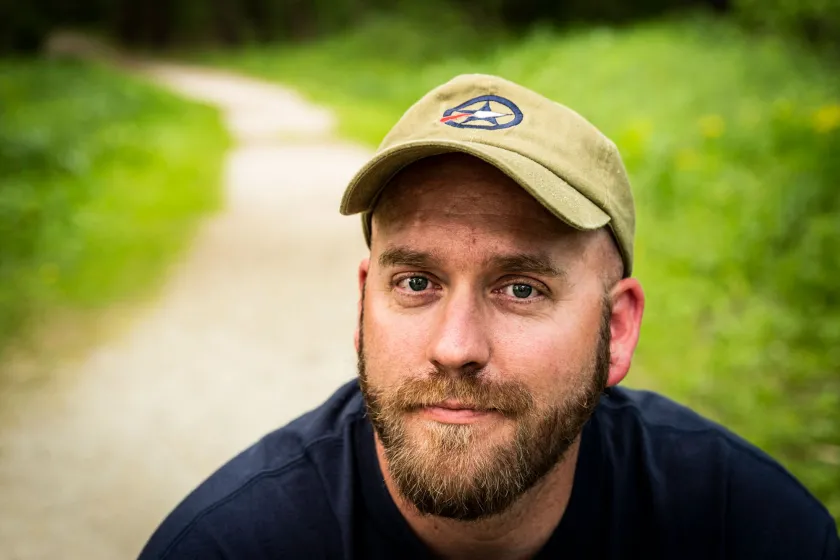
Hear from Greg Ashcroft
I’m Greg Ashcroft from Smithville, Utah.
I heard about AVAR through a friend who sent me a text message with their information. I immediately contacted Nichole and got involved with the dig that way. I’ve always had a passion for history and archaeology, and it sounded like an amazing opportunity to be involved with. I read through their mission statement and some of the stuff they stood for and one of the things they talked about was therapy through archaeology and therapy through work. That sounded like an amazing opportunity.
Unfortunately, I did not do any research prior to this gig. I regret that and I plan on going home and doing a lot of research on what’s going on here because it’s fascinating. It was a pivotal point in the Revolutionary War, and a truly amazing thing happened here.
For me it’s incredible to be here on the actual battlefield where that took place. I think back in my mind to another point in history when there were soldiers fighting in conflict who were involved in making America what it is today. And giving me the opportunity to have served and to be here. My service wouldn’t be possible without theirs. I do absolutely feel a connection with the soldiers who fought that battle. You know, we’re finding artifacts that were involved directly with the soldiers, and to me that’s amazing. We’re earning about their experiences through the artifacts we’re finding.
Finding artifacts that were associated with an individual who was fighting on this battlefield — when I pick up an artifact and am able to see an item that was maybe on an article of clothing, or something that they carried — tells a story in my mind of what one person went through. And I’m able to pick up that same artifact and now I have a story associated with that exact same item. To me that’s just an amazing experience.
I’m a hard worker. I’m the kind of guy you can give a task to and know it’s going to get done. I will just do it, and I will almost work myself into a coma accomplishing that task. Really, the work ethic of the whole group is phenomenal. Everybody on this dig is working hard from the moment we step on the battlefield until they tell us we’re done in the evening. I think a part of that is the work that we’re doing and the connection that we have with that. We feel a responsibility to put our best effort toward what we’re doing. So that we can accomplish the mission and find all the artifacts. Then the story can be told accurately, and we have it for posterity.
In this extremely short time that I’ve been here, I’ve learned history, yes. There have been some significant events that have happened here. I’ve learned that everyone is personally connected to the work that is being done and we all feel an obligation to discover as much as we can so we have an accurate record that we can show the world. This is one of the battles that formed America!
But, also, I’ve learned on this dig that I have not lost my ability to connect with other soldiers. The camaraderie is not gone. Al lot of times, when you get out of the service you get into your own rhythm and you start doing other things with your life. Then you look back and you think there’s an esprit de corps that is lost. But you come into a situation like this, where you’re surrounded with soldiers again and it’s powerful! It makes you feel good because that aspect of your life is not gone. You’re living your life and then you get back in this kind of situation where you start clicking with people immediately, and that’s highly emotional. That’s powerful, and I would be honored to be able to do another dig like this.
In learning different archaeological methodologies — and there are different procedures depending on what specifically you are trying to accomplish — I’ve seen there’ s not necessary one path to success. The more you come together as a team, you merge methodologies and you start being able to use other experiences form other people. The experience you have around that you can pull from helps you start building a cohesive unit.
It’s absolutely amazing to find things. I truly did not expect that. I thought we’d be digging around in the ground and pull up some metal. And it’d be cool, but whatever. And then you actually pull and item out of the ground! I don’t know if there’s a spirit to the object or what, but you pull an object out of the ground and you have a connection to that object. It’s telling you as story. It’s part of our story, all of our stories. When someone is pulling an object out of the ground, I’ve heard a whole transect area cheering. And that’s truly awesome.
The battlefield at Saratoga deserves our respect. When I think about the events that took place here, I feel emotional. This helped us create America, helped us get to where we are today. It helped us forge the freedoms that we enjoy. It’s a part of every one of our stories. I try to show reverence when I’m on the battlefield, because to me it is hallowed ground and it’s amazing.
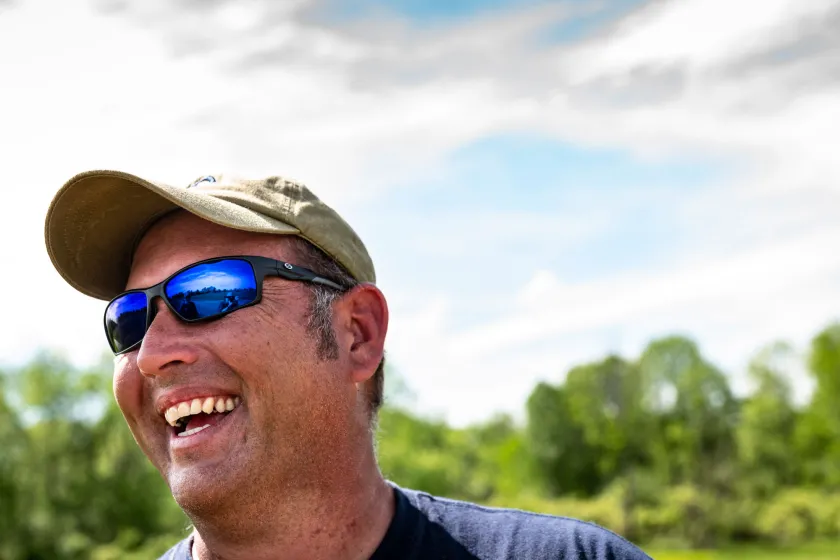
Hear from Tom Wyatt
I’m Tom Wyatt, from Converse, Texas. For me it’s amazing to be on the actual battlefield where the course of the Revolutionary War shifted. I think back in my mind that in another point of history there were soldiers fighting in a conflict who were involved in making America as it is today. They paved the way for me, gave me the opportunity to have served. It’s a moving experience when you’re on a battlefield where you know something significant happened.
I do absolutely feel a connection with the soldiers who fought at Saratoga. Finding artifacts that were associated with an individual who was fighting on this battlefield is an amazing experience. When I pick up an artifact — an item that was maybe on an article of clothing, or something that they carried — to me, it tells a story in my mind of what one person went through.
That talent that I bring to this is that I’m a hard worker. You can give a job and be confident it’s going to get done; I will almost work myself into a coma accomplishing that task. The work ethic of the whole group is phenomenal, and I think a part of that is the personal connection we have to the work we’re doing. We feel a responsibility to put our best effort toward what we’re doing so that we can accomplish the mission and find all the artifacts so that we can tell the story accurately for posterity. I’ve learned a lot of history in this extremely short time and I feel an obligation to share that with the world.
I’ve also learned on this dig that I have not lost my ability to connect with other soldiers — The camaraderie is not gone. Al lot of times when you get out of the service you get into your own rhythm and you start doing other things with your life, and you look back and you think there’s a esprit de corps that is feel like is lost. And if you come into a situation like this where you’re surrounded with soldiers again and it’s powerful because you realize that aspect of your life is not gone. When you get back in this kind of situation, you start clicking with people immediately and that’s highly emotional. That’s powerful.
Being at Saratoga with AVAR has been one of the coolest experiences of my life, and I would be honored to do another dig like this. Finding artifacts is absolutely amazing in a way that I truly did not expect. I thought we’d be digging around in the ground, and pull up some metal and, sure it’s cool, for a moment. But the reality is so different and spectacular. I don’t know if there’s a spirit to the object or what, but you pull it out of the ground, and you have an instant connection to that object. It’s telling you a story; it’s now part of all our stories as Americans. I’ve heard people cheering — a whole transect area cheering — because they just found something. What a truly awesome experience to be part of.
Saratoga is absolutely hallowed ground and it deserves our respect. The battlefield, these artifacts, deserve for us to treat them appropriately. What happened here helped us create America. It helped us get to where we are today and forge the freedoms that we enjoy. Being here, becoming part of that story makes me emotional. And so, I try to show reverence when I’m on the battlefield.
Also I’ve always kind of been a class clown. I bring humor aspect to the dig and to the home where we’re staying. I feel like laughter is a huge part of the comradery and the interaction that we have, and I feel that I contribute to that aspect.
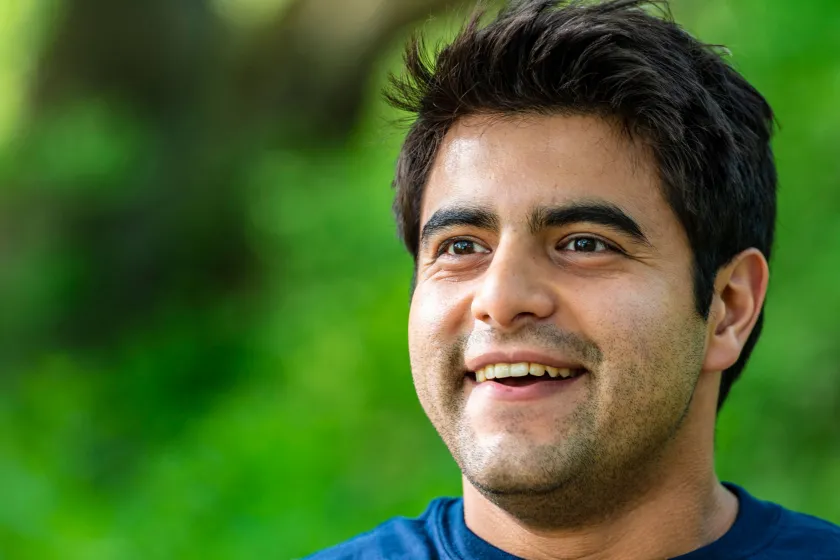
Hear from Zeth Lujan
My name is Zeth Lujan and I’m from Los Angeles Calif. I heard about AVAR from a gym buddy of mine who does veteran employment opportunities. He'd come up to me and said, “I just received this email. And you’re the only person I know that talks about archaeology, so you’ll probably be interested in this.” I read up on it — the similarities between archaeology and the military — and thought I had Stockholm Syndrome! That’s why I like archaeology so much.
I do love archaeology. I'm actually currently pursuing my undergraduate in archaeology, technology, and historical structures from the University of Rochester. I served in the Army from 2011-2014 and I would say my love for the field came from deployment. I'd never been anywhere older than that place I was sent with the 10th Mountain Division. My unit actually had standard operating procedures relating to cultural preservation and during my first dig with AVAR, I actually got to meet the person who wrote them, Dr. Lori Rush, when gave us a lecture on cultural preservation during wartime. So, in a way, my experience went full circle.
I feel like I bring an overall understanding of the archaeological process to this project because I’ve been through previous digs with AVAR, especially having dug internationally. It’s a different group of participants every time, different teachers, different instructors. So, I approach it with a holistic effort from what I’ve experienced prior.
I remember reading once that just one percent of U.S. citizens get to go into the military. When I think back on that statistic, I reflect on how it also applies to people as they transition back, how they can relate to those around them. There’s this disconnect, almost a stigma when you get out of the military, especially if you’re going to college. Some people thinking how you could have done something different but instead you chose that. And with AVAR, you’re surrounded by like-minded people that have that same approach work — the same motivation and focus — that you do, it’s very refreshing. You know no matter what service you had, no matter what experiences, you know you all signed the dotted line, embraced the suck, and now you can come here and do this. That I think is the best part, is experiencing that camaraderie.
To dig in an actual historic American battlefield is, I think, refreshing. It almost warrants that sense of “more” that you get from being in the military. You think that millions of people have worn that uniform and millions are going to come after us, after our service is done. To actually be here, I imagine looking through the eyes of those before us. I wonder how these people lived. I wonder what they did for fun, what was going through their heads. Knowing that you’re in an area where you know it was U.S. military, you can relate to what you’re digging for. You understand where they were coming from, which is a very different perspective to have, as opposed considering a culture that you wouldn’t understand.
Do I believe there was a type of kinship or connection from soldiers from back then? Yes. I mean, you’re always taught history and linage in the military. Stories of those who have served are always brought up when they’re connected to your division, part of your unit — sometimes even down all the way to the actual company. And to think that we get to come here and experience and even look for these linages that we’re told about, I think that’s very refreshing and very different.
Related Battles
330
1,135
